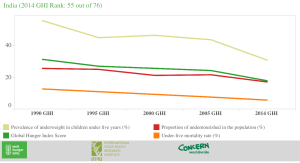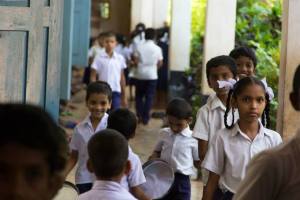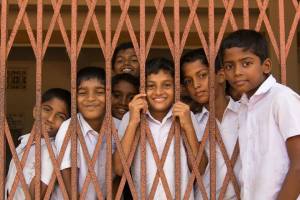I admit that I have been selfish. I haven’t been able to look past my own needs and write something for the sake of another. I have been procrastinating, thinking I will do it at some point before Christmas. Now I realize that today, midnight (IST), is the deadline. I have to hand in my minimum 300 words for a child in India to eat for 300 days of his/her school year.
I have known Akshaya Patra since its inception in 2000. When the NGO started in Bangalore our school organized a donation day and all us kids brought in a kilo or so of raw rice. Rice that we, as privileged children, never considered something that is worthy of presenting to others. When we opened our lunch boxes we hated the look and smell of it. We went instead to the canteen and bought oily unhealthy samosas, or if finances were running low we’d just chum it up with those of us who had better options – macaroni, sandwiches or even a nice chapathi wrap. The rice would surreptitiously then be emptied into the garbage/gutter close to school or outside the house (but just far enough that mom never suspects). The days we forgot to cover our tracks were the days when routine phrases like ‘You are ungrateful’, ‘You have no sense of the privileges you have’, ‘I slave and slave and slave…’ and my personal favourite from the arsenal of parental guilt – ‘When I was your age I did not have…’ story. So, that simple request to bring just rice – not money or clothes (things we were more interested in) made me realize for the first time that in the order of things a child truly needs provided FOOD always comes first.
Food as incentive to education
In 2001 the Supreme Court of India decreed that “Cooked mid-day meal is to be provided in all the Government and Government-aided primary schools in all the states.” But Akshaya Patra had been at it for a year already. The idea being that if parents with lesser means knew that if sent to school then at least one meal time a day their child would eat heartily and healthily and they wouldn’t have to pay for it then they would be eager to send their kids off to get an education rather than have them labour for wages. Akshaya Patra’s website has listed studies that show that its work has had a positive impact.
What I can offer to this rhetoric is what I have witnessed in my own family. My father comes from a poor family and was born in a little fishing village on the coast of the Arabian Sea. My father had to walk many miles to attend school and could not afford a pair of slippers. He made the walk with calloused feet and a fresh mind eager to learn. My grandfather, having sired more children than he could afford, moved to a city 800 kms away on the coast on the Bay of Bengal with his eldest son (my father) and worked at a menial position in a restaurant in the big city. He sent back all he could to his wife and kids in the village. My uncles and aunt attended the local village school run by a temple trust foundation and temples in that part of the country provide food (mid-day meal) as well. It’s part of the tradition there; a form of blessing. My grandfather wanted his children to study and work hard and not having to worry about them going hungry must have been such a relief. This school with its practice of providing free education and free food has consequently provided our family with 1 banker, 1 teacher, 1 NASA engineer and 4 highly successful doctors. I will not say that my uncles and aunt studied so that they could eat. No. They knew that education was their only ticket out. But I am sure that the commitment they have to education and the respect they have for their parents, country and its traditions has to do a lot with the school that fed not only their hungry minds but also their hungry stomachs.
Hunger Games is creative non-fiction
While preparing to write about hunger among children in India I did some light research. I went on to World Food Programme’s website and learnt something I didn’t know about my country: India is home to a quarter of all undernourished people in the world. There are some shocking statistics in there about the situation worldwide for you to read and they motivate you to be at least thankful this holiday season if not giving.
I wanted to learn more about malnutrition in children in India and I found an article recently published by The Economic Times helpful and disturbing despite its optimistic undertones.
It seems that my country has gone from being 63rd out of 76 countries to 55th in the Global Hunger Index, which is determined and reported by the International Food Policy Research Institute in collaboration with the NGOs Welthungerhilfe and Concern Worldwide.


The reason India has moved ahead is because a lot has been done, successfully, to undercut malnutrition in children over the past few years. This has taken India from being “second to last on underweight in children, [to] 120th among 128 countries with data on child undernutrition from 2009-2013”. Compare this standing with another fact: India is the tenth-largest economy based on nominal GDP and third-largest based on Purchasing Power Parity in the world, according to the recent IMF report (2014). It doesn’t take a degree in social sciences to know that something’s wrong. We are still behind Nepal and Sri Lanka on the GHI but ahead of Bangladesh and Pakistan in case any one is keeping track of competing countries in the sub-continent. Nothing gets us going like wanting to beat our neighbours at everything.
Social responsibility is taught by example
Donating food and sharing food with strangers is not a new concept in India. In the days of yore Brahmins who had given up their right to possessions used to go by houses for alms. The very act of supplication was considered a lesson in humility since one can become very egocentric as a Brahmin, as an intellectual. My maternal grandmother would always cook for an additional person for, ‘You never know who may turn up’ and ‘We must never refuse anyone food’. As children growing up in India you are taught that it is your moral duty to provide food from your own plate to your guest even if it all that you have. It is part of Indian hospitality: ‘Athithi Devo Bhava’, a Sanskrit adage which is translated as ‘Guest is God’. Anna-daanam or rice donation is considered a form of prayer.
So why is it that while we have such core beliefs about food so many of us go under-fed? It’s obvious really – we share only within our own worlds. Robert Pirsig had it right when he wrote,
We take a handful of sand from the endless landscape of awareness around us and call that handful of sand the world.
But it’s not very difficult to take it a bit further than our doorstep I find. My parents have set a fine example for me. I have seen them regularly contribute for years to a local school for it to buy supplies and even for its structural renovations. My mother, when she lived in Ukraine, visited an orphanage with toys and edible goodies even though she does not speak any Ukrainian or Russian. She has been fortunate enough to have had enough to eat growing up but it has come at a cost of her father eating only boiled peanuts for dinner so that his children (mostly girls no less) could eat and study. Neither of my parents have ever taken their comforts in their adult years for granted, for the precise reason that they were hard-earned. They studied, ate what they received, worked hard and made our lives so easy. They were right to tell us those guilt-inflicting stories. That’s also how they taught us social responsibility.
I look back on those lunches I took for granted and I don’t think I have committed a bigger crime. The idea of wasting food now makes me cringe and I cannot abide by it no matter where I am. Here in Switzerland there isn’t any obvious poverty but that doesn’t mean there are no hungry people. We took the left-overs from our Swiss wedding to the local homeless shelter. The people were shocked to find a Swiss man in a three-piece suit and a brown girl in a white wedding gown dropping off a lot of expensive food at 9pm on a Wednesday. In turn we received such sincere wishes for a happy married life that it left us both aglow with contentment.
As Indians living abroad it is easy to fall into a shame spiral and feel like we are not contributing to the betterment of our nation. Even if you don’t actively contribute to an NGO and rather want to do this yourself it is still not so hard to do. Ask your family or friends back in India about the schools in your community that could use monetary assistance or fresh stationary. In fact when we were having our wedding in India my husband’s best friend considered it worth his while to engage a major Swiss retail store, Migros, to contribute some stationary to be taken to an under-privileged school in India. We had organized a trip across Mangalore-Udupi districts for our friends and we took them to a school in the tiny fishing village called Uchila, the origin of my paternal grandmother. They were really happy to receive the gifts. The children were thrilled to see white people and I witnessed for the first time a mid-day meal in progress. If you have ever felt that your tax money is not doing enough then go to a school while they are serving food. I guarantee that you will come out smiling. Taking some chocolates with you is not a bad idea either. It was a great day and here are a few photos from that day,

Q & A
How to eliminate classroom hunger? I am not a policymaker or a social scientist to have the ‘right’ answers or a POA. All I can say is do what you can in every way you can wherever you are. It doesn’t have to be a grand gesture. There are many platforms where you can contribute. Heck! All I am doing right now is writing a blog. And while you are at it, why stop at classroom hunger?
What will it mean to have a generation that is fed and educated? You will have peace and prosperity. If every child is educated and not just literate then we’ll have less rape and abuse and more empowerment. We’ll find that a nation can, not only produce efficient professionals, but also caring patriots who act as global citizens.
I leave you with this touching video by Akshaya Patra presented over a lovely song composed by the amazing A. R. Rahman. It’s a song in Tamil about the purpose of one’s life but you don’t need to understand the words to get the message. I wish you all a wonderful life without hunger.
I am going to #BlogToFeedAChild with Akshaya Patra and BlogAdda.







its a great job 🙂 nice blog 🙂
LikeLike
So glad that you too chose to be a part of this, Sam 🙂 Well done.
LikeLiked by 1 person
Thank you Shailaja. I was inspired by your post 🙂
LikeLiked by 1 person
OH that’s lovely to hear ❤
LikeLiked by 1 person
After Malalas speech at Oslo, Noble Prize giving ceremony, your Writing is thought provoking. Well Written.
LikeLiked by 1 person
Thank you!
LikeLike
Very touching and eye opener. The hard life a child faces enables him/her to face the hardships of adult life with more confidence and courage. Be helpful to the society. What you have written is very true. Please go ahead.
LikeLiked by 1 person
Thank you for the support. I appreciate you taking the time to read and comment.
LikeLike
Thank you Sam for such a lovely, and informative write. Sheen.
LikeLiked by 1 person
Thank you for reading Sheen. 🙂 I am glad you liked it and found it useful.
LikeLike
Beautiful, Sam! A great reminder to feed one another – thank you!
LikeLiked by 1 person
Thank you Paula! 🙂
LikeLike
I’d appreciate that! 😏 Thanks!
LikeLiked by 1 person
While you were commenting on my blog, I was thoroughly engrossed in your post. I’m pretty sure I’ll come back to read it all over again when I’m less busy! Loving it.
LikeLike
Aw, thanks hon. Welcome back anytime. It was an eye-opener for me too. I’ll stick it onto my front page. So if you don’t manage before I post again you’ll be sure to find it easily enough. 🙂
LikeLike
Finally read it. It is so heartwarming to see the children’s faces lit up with smiles. You’re doing a really great job and I hope to do things like this too when I have the resources. Cheers.
LikeLiked by 1 person
I agree with you. It feels really good. I wish all the best. Thanks for coming back 🙂 cheers
LikeLiked by 1 person